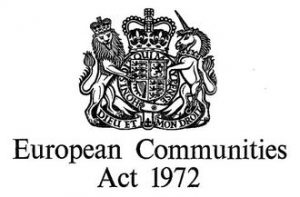By Dr Eirik Bjorge, Senior Lecturer in Public International Law (University of Bristol Law School).
 According to a carefully argued contribution by Professor Finnis in the Miller debate, rights under the European Communities Act 1972 ‘are not “statutory rights enacted by Parliament”’; they are only ‘rights under the treaty law we call EU law, as it stands “from time to time”’. Finnis thus purports to have broken the chain of the claimant’s main argument.
According to a carefully argued contribution by Professor Finnis in the Miller debate, rights under the European Communities Act 1972 ‘are not “statutory rights enacted by Parliament”’; they are only ‘rights under the treaty law we call EU law, as it stands “from time to time”’. Finnis thus purports to have broken the chain of the claimant’s main argument.
In that connection, Finnis considers the somewhat recherché example of taxation treaties and the Taxation (International and Other Provisions) Act 2010 to be a useful analogy. The point of the present contribution is to suggest that a more natural analogy would be the Human Rights Act 1998 and the European Convention on Human Rights (ECHR). Like the ECA 1972, the HRA 1998 conditions the legal relationship between citizen and state in an overarching manner and deals with fundamental constitutional rights. There is also particularly instructive judicial authority on the HRA 1998 specifically on question of the nature of its relationship with the international treaty whose obligations it mirrors. (more…)









